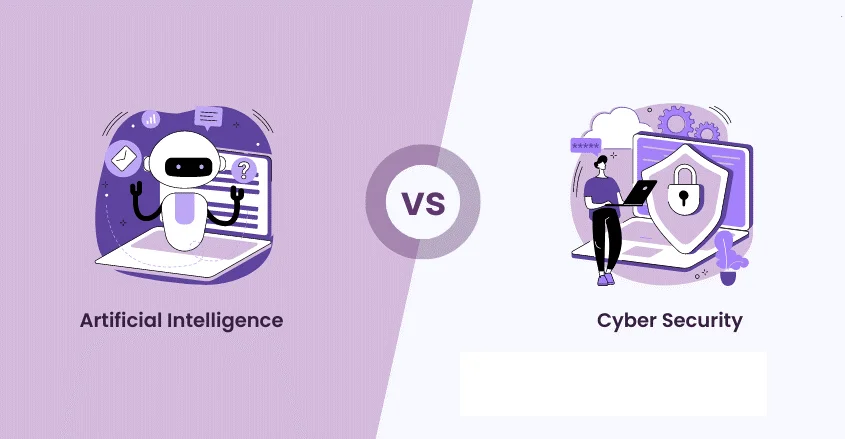Due to their potential influence on various industries, AI and cybersecurity have garnered attention in recent years. Therefore, most people trying to decide on the finest career choice wonder whether they would be better off working in Artificial Intelligence vs Cyber security.
The purpose of this article is to analyze and contrast the job prospects, necessary skills and expertise, salary comparison, job security, industry demand, stability, and growth, as well as career advancement opportunities, for people pursuing careers in artificial intelligence vs cyber security by 2025.
According to a report by Market Research Future, the global AI market is expected to reach $190 billion by 2025, with a compound annual growth rate of 36.6%. On the other hand, the cyber security market is projected to grow at a CAGR of 10.7% during the same period. These statistics indicate that both AI and cybersecurity are promising fields with substantial growth potential.
Artificial Intelligence Vs Cyber Security

Artificial intelligence (AI) and cyber security are two distinct fields, each with their own unique challenges and opportunities. AI focuses on creating intelligent systems that can perform tasks autonomously, while cyber security deals with protecting computer systems from unauthorized access or damage.
In the realm of AI, researchers strive to develop algorithms and models that can mimic human intelligence and make autonomous decisions. This involves training AI systems on vast amounts of data, enabling them to learn patterns, recognize objects, and even make predictions. The goal is to create machines that can think, reason, and problem-solve like humans.
On the other hand, cyber security experts are concerned with safeguarding computer systems and networks from various threats, such as hackers, malware, and data breaches. They employ a range of techniques, including encryption, firewalls, and intrusion detection systems, to protect sensitive information and prevent unauthorized access.
While AI and cyber security may seem unrelated, they intersect in the context of defending against cyber attacks. AI can be leveraged to enhance cyber security measures by automating threat detection and response. Machine learning algorithms can analyze network traffic, identify anomalies, and flag potential security breaches in real-time. This enables organizations to proactively defend against cyber threats and mitigate potential damages.
However, the use of AI in cyber security also presents its own set of challenges. Adversarial attacks, in which malicious actors manipulate or deceive AI systems, present a serious risk. Hackers can exploit vulnerabilities in AI algorithms to bypass security measures or launch sophisticated attacks. Therefore, it is crucial for cyber security professionals to constantly adapt and evolve their strategies to stay one step ahead of cyber criminals.
Artificial Intelligence Vs Cyber Security : Future Job Prospects

The future job prospects for artificial intelligence (AI) careers are promising, with a wide range of job options available. As AI continues to advance and become more integrated into various industries, professionals skilled in areas such as machine learning, data analysis, and natural language processing will be in high demand.
On the other hand, cyber security job options are also expected to grow significantly due to the increasing reliance on technology and the need to protect sensitive information from cyber threats. Roles such as cyber security analysts, ethical hackers, and security engineers will play crucial roles in safeguarding digital assets against potential attacks.
Al Career Job Options
One potential area for employment within the field of artificial intelligence is in the development and implementation of machine learning algorithms. This involves creating algorithms that can learn from and analyze large sets of data to make predictions or decisions.
Other job options include working in natural language processing, computer vision, robotics, and expert systems. These roles require a strong background in mathematics, statistics, programming languages like Python or R, and knowledge of AI frameworks such as TensorFlow or PyTorch.
Cyber security Job Options
Cyber security, a realm of digital guardianship shielding against invisible threats, offers a labyrinthine array of employment opportunities. Professionals in this field can pursue various job options, including:
- Security Analyst: Conducting vulnerability assessments and implementing security measures.
- Incident Responder: Investigating and mitigating cyber incidents.
- Ethical Hacker: Identifying vulnerabilities in systems to enhance security.
- Cryptographer: Designing and analyzing cryptographic algorithms.
- Security Consultant: Advising organizations on best practices for protecting their digital assets.
These roles demand technical expertise, analytical skills, and an unwavering commitment to safeguarding sensitive information.
Ai Vs CyberSecurity : Skills and Expertise Needed

To excel in the field of artificial intelligence vs cyber security by 2025, professionals must possess a wide range of specialized skills and expertise.
In artificial intelligence, knowledge in machine learning, natural language processing, and deep learning is crucial.
Cyber security professionals need proficiency in areas such as network security, cryptography, and incident response.
Additionally, both fields require strong analytical thinking abilities, problem-solving skills, and an understanding of ethical considerations to effectively address emerging challenges in technology.
Artificial Intelligence Vs Cyber Security : Salary Comparison

Here we’ll look at the pros and cons of working in artificial intelligence vs cyber security, specifically focusing on employment security, stability, and development.
Job security refers to the assurance of having a stable employment with minimal risk of losing one’s job.
Job stability, on the other hand, pertains to the consistency and reliability of a particular profession or field over time.
Lastly, growth examines the potential for career advancement and development within these respective domains.
Artificial Intelligence Vs Cyber Security : Job Security

Job security is a crucial aspect to consider when comparing the fields of artificial intelligence and cyber security in 2025. Both fields are expected to have high demand, given the increasing reliance on technology.
However, cyber security professionals may have an edge in terms of job security due to the constant need for protection against evolving threats. The growing interconnectedness of systems and networks will require skilled individuals who can ensure data confidentiality and prevent cyber attacks, making cyber security a more stable career choice.
To further highlight the job security aspects of both fields:
- In AI:
- Research and development roles focused on enhancing AI capabilities are likely to see sustained demand.
- Positions related to ethical considerations surrounding AI implementation may emerge as regulations evolve.
- Specialized roles such as natural language processing experts or computer vision engineers could experience increased demand due to their specific skill sets.
- In Cybersecurity:
- Incident response analysts will remain essential in quickly addressing breaches.
- Security consultants will be sought after to assess vulnerabilities and recommend appropriate solutions.
- Compliance officers will continue playing a critical role in ensuring adherence to legal frameworks governing data protection.
Artificial Intelligence Vs Cyber Security : Job Stability and Growth

One significant factor to consider when comparing the fields of artificial intelligence and cyber security in 2025 is the potential for long-term career growth and stability. In terms of job stability, both fields are expected to have a high demand for skilled professionals due to the increasing reliance on technology and the growing threat landscape.
However, artificial intelligence offers a wider range of opportunities with its applications in various industries such as healthcare, finance, and transportation.
Ai Vs CyberSecurity : Career Advancement Opportunities in 2025
Career advancement opportunities in 2025 are abundant and promising, with the projected growth of artificial intelligence leading to a staggering 85% increase in demand for professionals in the field of cyber security.
As AI becomes more prevalent, so does the need for experts who can protect against its potential risks.
This surge in demand will create numerous avenues for career progression within cyber security, such as specialized roles in AI-driven threat detection and mitigation, offering professionals the chance to develop their skills and expertise in this rapidly evolving field.
Frequently Asked Questions
What are the specific job roles and responsibilities within the field of artificial intelligence vs cyber security?
Specific job roles in artificial intelligence include machine learning engineer, data scientist, and AI researcher. Responsibilities may involve developing algorithms, analyzing data, and designing intelligent systems. In cybersecurity, roles include security analyst, ethical hacker, and incident responder. Responsibilities include identifying vulnerabilities, implementing safeguards, and responding to security incidents.
How can individuals acquire the necessary skills and expertise to work in the artificial intelligence vs cyber security industries?
Formal education, specialized training programs, certifications, and hands-on experience are all viable paths to acquiring the knowledge and abilities essential for a career in the AI vs cybersecurity sectors. Recent research indicates that the need for cybersecurity experts would rise by 31% by the year 2029.
Are there any notable differences in salary between artificial intelligence vs cyber security professionals in 2025?
There may be notable differences in salary between artificial intelligence and cyber security professionals in 2025. Factors such as demand, industry, location, and experience can influence the remuneration of professionals in these fields.
What are the potential job security risks or challenges faced by professionals in the artificial intelligence vs cyber security fields?
Increased cyber risks, emerging technologies needing constant learning, and AI ethics are possible hurdles for AI vs cybersecurity experts.
What are the future career advancement opportunities for individuals working in artificial intelligence and cybersecurity in 2025?
In 2025, professionals in artificial intelligence and cybersecurity can expect future career advancement opportunities such as specializing in niche areas, leading research and development projects, or taking on managerial roles to oversee teams and strategies for organizations’ technological needs.
